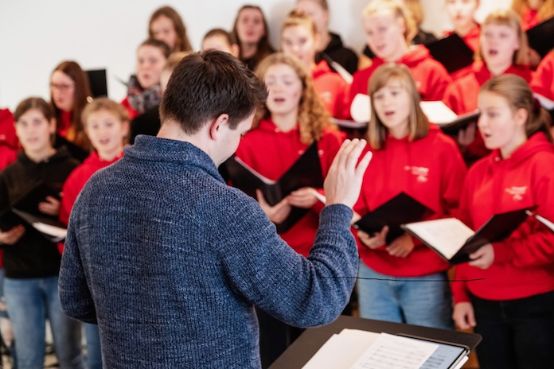Meeting place for the choral scene
Around 2500 professional participants attended chor.com, the largest German-speaking event for vocal music.

In times of declining volunteer commitment, it is not a matter of course that choir directors, trainers, club leaders and, last but not least, singers gathered in Hanover for four days in September to discuss issues relating to choral work. While many of the 180 or so workshops focused on choir-specific topics (pop choir conducting, children's choir work, complete vocal technique, stand-up composing, reading sessions on new literature), a surprisingly large number of working groups asked questions about club and association work. For example, the German Choral Youth discussed clever lobbying for their own cause: in many places, public support is undisputed, but is not (yet) accompanied by anywhere near sufficient financial support - despite the mantra-like repetition of the words "social cohesion" that associations offer with their cultural work.
More support for choir conductors required
Theo Geissler, publisher of the New Music Newspaper NMZasked: "Can the choir conductors still be helped?" In the panel discussion with this title, with Kevin Breitbach from the International Choir Conductors' Association and Nelli Holzki from the Swabian Choir Association, among others, increased efforts were called for from the sponsoring organizations. The diverse management and educational tasks would have to be shouldered jointly and - where necessary - mandates for large projects would have to be awarded externally.
In the lively and serious debates, it became clear time and again that the next generation has long been at work and is ready to take over the existing, sometimes outdated structures and enrich them with contemporary ideas and communication.
Concert program from jewels to rarities
The more than 10,000 concertgoers were spoiled for choice; 35 events were scheduled over four evenings in churches and halls throughout the city. The opening evening already showed the range of vocal music-making: a classical motet program by the NDR Radio Choir (conducted by Klaas Stok) with works by Johann Sebastian Bach and Johannes Brahms enchanted the audience in the Neustädter Hof- und Stadtkirche and left only the wish that people would always come together to perform this music. Meanwhile, in the Theater am Aegi, Maybebop and Unduzo showed how entertaining a cappella pop can be in a highly musical way.
The members of the youth choir of the Hanover University of Music and Drama and the girls' choir of the Berlin Sing-Akademie had prepared a curiosity. Under the expert direction of Friederike Stahmer, they performed "Alterssünde" The donkey's shadow by Richard Strauss, a forgotten youth opera by the composer for his grandson, who was worried about his promotion at the grammar school in Ettal and tried to appease the principal with it.
Training courses and network meetings
For the first time, the local choral scene was represented by a stand of the Swiss Choral Association. At the freely accessible forum in the Congress Centrum Hannover, opportunities to exchange ideas with Swiss (youth) choirs, work opportunities as a choir director and choral literature were particularly in demand; thankfully, a collection of current Swiss choral compositions and arrangements compiled by Johannes Meister was available.
"chor.com is a unique platform where the choral scene comes together in all its diversity. People come together, exchange ideas and learn from each other. chor.com is a hub and signpost for the growing international vocal music scene. It has an impact on our society and as a format is as great as it is indispensable," emphasized Christian Wulff, President of the German Choral Association.
Deutschlandfunk Kultur accompanied numerous events, which are now available to listen to: dlfkultur.de
The next chor.com will take place in Hanover from September 23 to 26, 2021.








